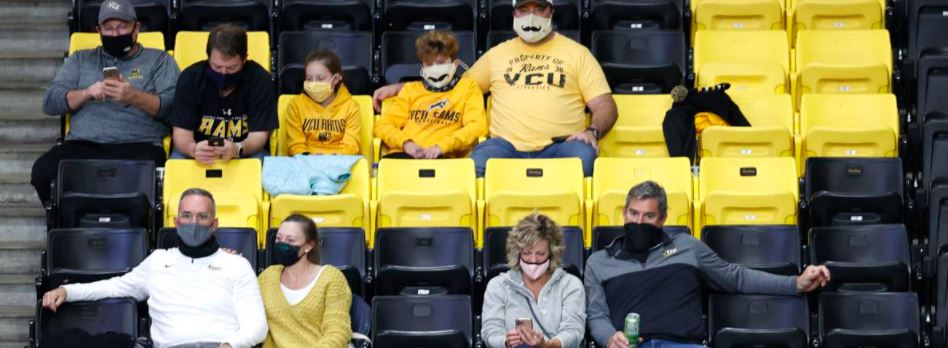
In the age of COVID and online courses, should students be forced to subsidize college athletic events attended mainly by alumni and their families, like this VCU basketball game? Photo credit: Richmond Times-Dispatch
by James A. Bacon
A bill that would make optional the paying of athletic fees at public Virginia universities died in a state Senate subcommittee Monday.
Virginia universities charge some of the highest athletic fees in the country. According to a 2020 report by NBC News, Virginia Military led the nation with a $3,650 fee. James Madison University ranked third, and six Virginia institutions were in the top seven, based on charges in the 2017-18 school year.
Sen. Bill DeSteph, R-Virginia Beach, introduced the bill, SB 1359, which would have required Virginia’s public institutions to disclose to “student and parent consumers” a process to opt out of paying athletic fees. The bill was “passed by indefinitely,” effectively tabled for the duration of the 2021 General Assembly session.
DeSteph asked how colleges justify charging an athletics fee when many teams aren’t playing and, even when they do, in many cases students can’t attend, reports The Roanoke Times.
“Is it fair for [students] to continue to pay these fees when they’re not getting what they paid for?” asked Stacie Gordon of the Partners for College Affordability and Public Trust.
Colleges have been criticized as well for charging full tuition, room and board even while many classes are being taught online. But the higher-ed lobby is powerful in Virginia and the consumer movement is weak. The Office of the Attorney General, designated as the state’s consumer advocate, largely restricts itself to prosecuting consumer scams and frauds rather than representing citizens in cases involving energy, healthcare and higher-ed policy.
Defenders of mandatory athletic fees argued that making fees optional would have devastating economic consequences for university finances or have a negative economic impact to university communities.
Elizabeth Hooper with Virginia Tech cited a recent study that concluded Virginia Tech brings $69 million in economic impact to southwest Virginia through hotels, restaurants, taxes and other means. Most of that money, she said, comes from the football team.
Virginia Commonwealth University’s Ashley Hood said that the school’s $910 athletic fee amounts to more than 50% of the athletic program’s operating budget. An optional fee would have “dire consequences,” in the words of the RTD.
Peter Blake, executive director of the State Council of Higher Education for Virginia (SCHEV), offered a different argument. Athletic programs serve as advertisements for colleges, which benefits students. Fees help pay for facilities, scholarships and debt. If fees were made optional, college would have fewer facilities and scholarships to offer.
Bacon’s bottom line. Let us skewer the mandatory-fee logic argument by argument.
Economic impact. Robbing Peter to pay Paul does not create a net positive economic impact — it just transfers money from where it is not seen and measured (family budgets) to locations where it can be seen and measured (hotel and restaurant revenue). As for the Virginia Tech football team, students don’t account for the influx of sports fans on game weekends — the people renting hotels and eating out in restaurants are alumni and other adult fans.
Dire consequences. Dire consequences for who? VCU’s athletic program? How about the consequences of mandatory fees for VCU students? VCU brags about how it serves first-generation college kids — typically lower-income and minorities. In many cases, students have to borrow money to cover their fees. Over four years, mandatory athletic fees at VCU amount to $3,600 or more. That’s $3,600 in debt for poor and minority students. Athletic fees add nothing to their educational credentials, career prospects, or earnings potential if they graduate. As for the 36% of VCU who students don’t even graduate within six years, they carry debt for mandatory athletic fees without the benefit of getting the workforce credential they need to pay it off. If you’re worried about institutional racism in the real world and not the make-believe world of Critical Race Theorists, this is what it looks like.
Scholarships. Sure, athletic programs generate scholarships for students. But… First point: What is the graduation rate for college athletes? Could these scholarship go to more deserving students who could make better use of the educational opportunity. Second point: There is no moral case for asking students to subsidize the education of other students. In a public university, scholarship funds should come from private philanthropy or General Assembly allocations.


